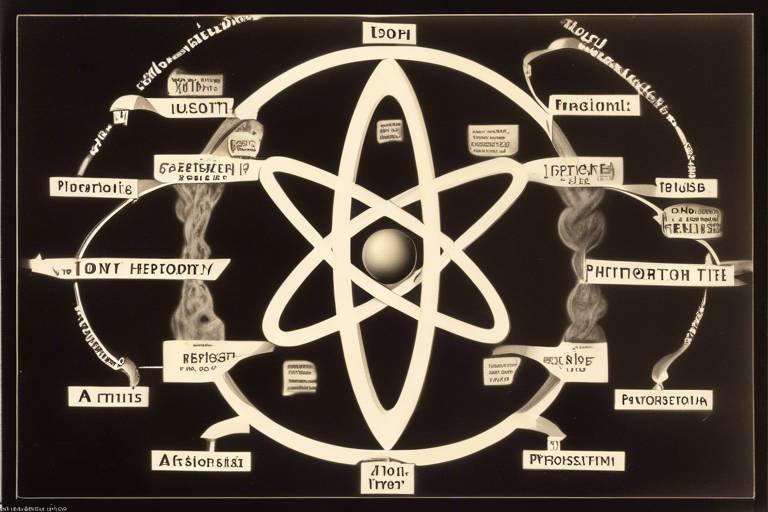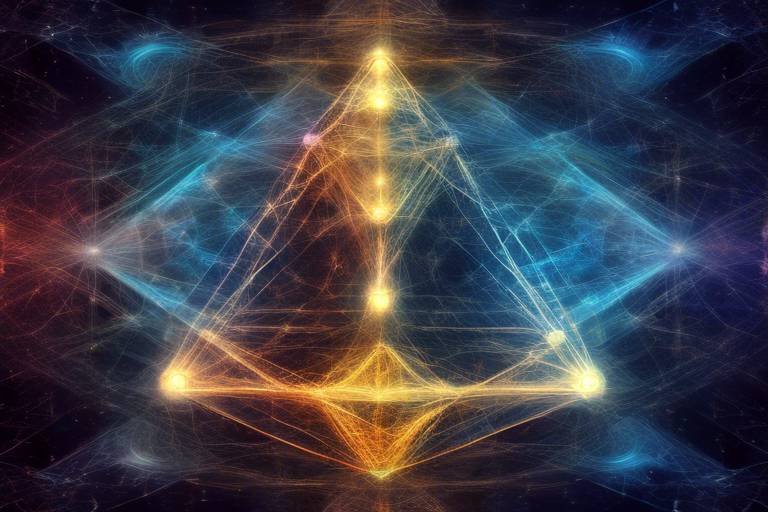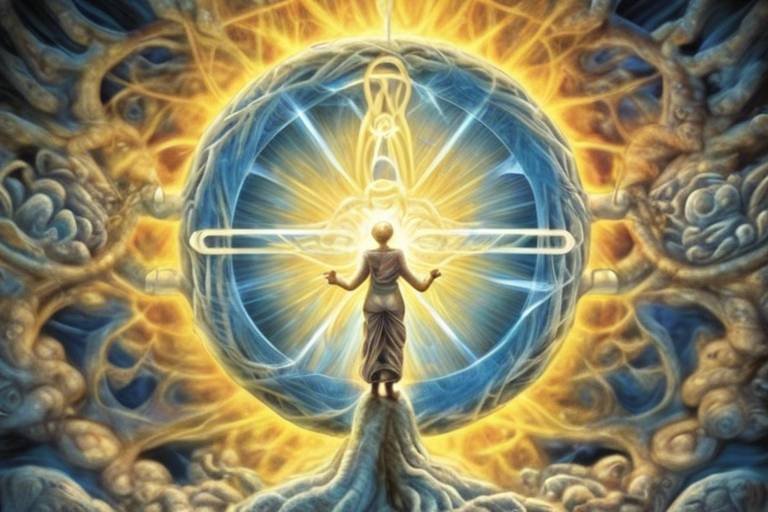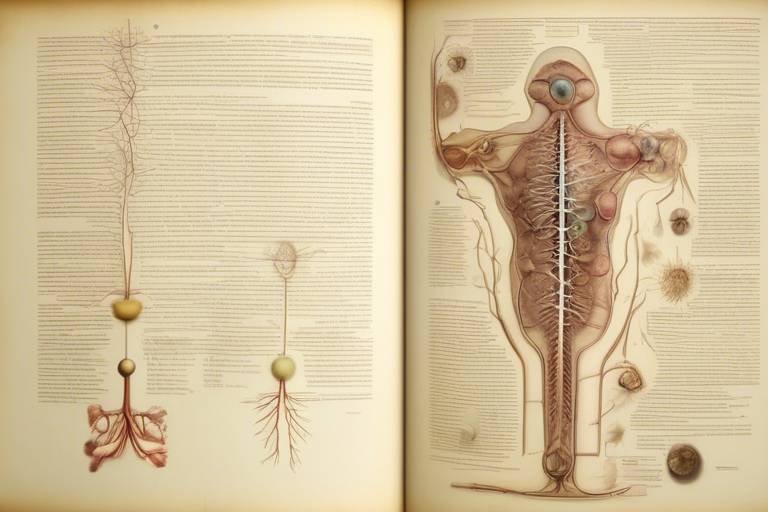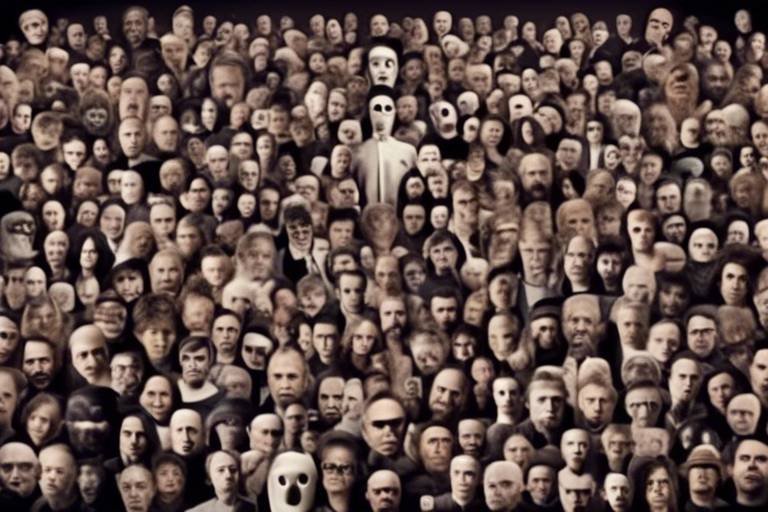Defining Life - Philosophy’s Role in Biology
The question of what constitutes life is one of the most profound inquiries in both philosophy and biology. As we delve into this fascinating intersection, we uncover a tapestry woven from threads of scientific discovery, ethical considerations, and philosophical musings. Life, in its myriad forms, challenges us to define it beyond mere biological criteria. It compels us to consider what it means to be alive, pushing the boundaries of our understanding and inviting us to explore the essence of existence itself.
At its core, the definition of life is not just a biological question; it is a philosophical one. Think about it: how do we differentiate between a living organism and a lifeless entity? Is it simply the presence of cellular structure, metabolism, or the ability to reproduce? Or is there something more? This inquiry leads us to engage with various philosophical perspectives that have shaped our understanding of life. From Aristotle’s notion of the “soul” as the essence of life to modern discussions that consider consciousness and experience, the definitions we adopt can significantly influence our scientific inquiries and ethical considerations.
The complexity of life is further compounded by the existence of entities that blur the lines between living and non-living. For instance, viruses challenge our traditional definitions of life. They possess genetic material and can evolve, yet they lack the cellular structure that characterizes living organisms. This ambiguity raises important questions: Should we classify viruses as living beings? What implications does this have for our understanding of life? As we navigate these questions, we realize that philosophy plays an essential role in guiding our biological explorations. It encourages us to reflect on the implications of our definitions and to consider the broader ethical landscape that accompanies our scientific pursuits.
In discussing life, we must also consider the ethical implications that arise from our definitions. How we define life can influence debates surrounding bioethics, conservation efforts, and even our treatment of other living beings. For example, the question of when life begins is central to discussions about reproductive rights and bioethics. Similarly, our understanding of what constitutes a "living being" can impact conservation policies aimed at protecting endangered species. The philosophical frameworks we adopt can shape our moral responsibilities towards other forms of life, guiding our actions and policies in profound ways.
So, as we embark on this journey through the philosophy of biology, let us remain open to the myriad ways in which these two fields intersect. By examining the definitions and implications of life, we can enrich our understanding of both the biological world and our place within it. Ultimately, the quest to define life is not merely an academic exercise; it is a deeply personal inquiry that challenges us to reflect on our values, beliefs, and responsibilities as stewards of the living world.
- What is the philosophical definition of life?
The philosophical definition of life often encompasses not just biological criteria but also aspects such as consciousness, experience, and the essence of existence.
- How do viruses fit into the definition of life?
Viruses challenge traditional definitions of life as they exhibit characteristics of living organisms but lack cellular structure, leading to debates about their classification.
- What are the ethical implications of defining life?
Definitions of life can influence bioethical debates, conservation efforts, and our moral responsibilities towards other living beings.

The Nature of Life
When we think about the nature of life, we often find ourselves grappling with profound questions that stretch beyond mere biological definitions. What truly constitutes life? Is it the ability to grow, reproduce, or respond to stimuli? Or is there something more elusive at play? Philosophers and scientists alike have pondered these questions for centuries, leading us down a winding path filled with various perspectives and interpretations.
At its core, life can be characterized by several key attributes, including metabolism, growth, reproduction, and the ability to respond to environmental stimuli. However, these characteristics alone do not provide a comprehensive definition. For instance, consider viruses: they exhibit some characteristics of life, such as reproduction and adaptation, yet they lack others, like independent metabolism. This ambiguity forces us to reconsider our definitions and the boundaries we place around what we deem 'alive.'
Philosophical inquiries into the nature of life often lead to a deeper understanding of the complexities involved. For example, the distinction between living and non-living entities can sometimes feel like trying to separate the colors of a sunset—blurry and intertwined. This complexity is further compounded by the advent of synthetic biology, where scientists are creating life-like systems that challenge traditional definitions. As we delve deeper into these discussions, we must ask ourselves: Are we prepared to redefine life in the face of new discoveries?
To illustrate the various perspectives on life, let’s consider a few philosophical frameworks:
- Biological Essentialism: This view posits that there are essential qualities that define all living organisms. However, this perspective can be rigid, failing to account for the nuances of life.
- Process Philosophy: In contrast, this approach suggests that life is defined by processes rather than static characteristics, emphasizing the dynamic and ever-changing nature of living systems.
- Holism: This viewpoint argues that life cannot be fully understood by analyzing its individual parts; instead, it is the interactions and relationships among those parts that define it.
As we navigate the philosophical landscape surrounding the nature of life, we must also consider the implications for scientific inquiry. The definitions we adopt can shape research priorities, influence ethical considerations, and even affect policy decisions. For instance, how we define life can have profound impacts on debates around bioethics, conservation, and the treatment of organisms in scientific research. The questions we ask and the answers we find ultimately guide our understanding of our place in the world.
In conclusion, the nature of life is a tapestry woven from various philosophical threads, each contributing to our understanding of existence. As we continue to explore these themes, we must remain open to the idea that our definitions may evolve, just as life itself does. After all, isn’t the journey of discovery what makes the exploration of life so fascinating?
- What are the main characteristics that define life? Life is typically characterized by metabolism, growth, reproduction, and responsiveness to stimuli.
- How do viruses fit into the definition of life? Viruses display some characteristics of life, such as reproduction and adaptation, but lack independent metabolism, complicating their classification.
- Why is it important to define life? Definitions of life influence scientific research, ethical considerations, and our understanding of the natural world.

Philosophical Frameworks in Biology
The study of biology is not merely a collection of empirical observations and experiments; it is deeply intertwined with philosophical frameworks that help shape our understanding of life itself. When we dive into the realm of biological inquiry, we encounter several philosophical perspectives that guide scientists in their quest for knowledge. Two of the most significant frameworks are vitalism and reductionism. Each of these philosophies offers unique insights and challenges, influencing how researchers interpret biological phenomena and the essence of life.
Vitalism posits that life is governed by a vital force that distinguishes living organisms from inanimate matter. This perspective suggests that there is something inherently special about living beings—a spark that cannot be fully explained by the laws of chemistry and physics alone. Vitalists argue that life processes are more than just mechanical interactions; they involve a unique essence that animates living things. Historically, vitalism played a crucial role in early biological thought, providing a framework for understanding the complexities of life before the rise of modern science.
On the other hand, reductionism takes a more mechanistic approach, breaking down complex biological systems into their simplest components. This philosophy argues that by understanding the individual parts—such as genes, cells, and molecules—we can gain a comprehensive understanding of how life operates as a whole. Reductionism has been instrumental in the advancement of modern biology, leading to significant breakthroughs in genetics, molecular biology, and biochemistry. It emphasizes the idea that life can be understood through the lens of physical laws and chemical reactions.
These two frameworks often stand in contrast to one another, each offering valuable perspectives on the nature of life. To illustrate their differences, consider the following table:
| Aspect | Vitalism | Reductionism |
|---|---|---|
| Definition of Life | Life is guided by a vital force. | Life can be explained through physical and chemical processes. |
| Approach to Study | Holistic, emphasizing the whole organism. | Analytical, focusing on individual components. |
| Historical Influence | Prominent in early biological thought. | Dominant in modern biological sciences. |
This table highlights the fundamental differences between vitalism and reductionism, showcasing how each framework contributes to our understanding of biological phenomena. While vitalists might emphasize the importance of the organism's overall context and experience, reductionists focus on the mechanistic details that underpin life processes.
Moreover, the implications of these philosophical frameworks extend beyond academic discussions; they also influence practical applications in fields such as medicine and environmental conservation. For instance, if one subscribes to a vitalistic viewpoint, they may advocate for holistic approaches to healthcare, emphasizing the importance of treating the whole person rather than just the symptoms. Conversely, a reductionist might focus on targeted therapies that address specific biological pathways.
As we navigate through the complexities of biological research, it becomes evident that these philosophical frameworks are not mutually exclusive. In fact, many scientists find value in integrating aspects of both vitalism and reductionism to create a more comprehensive understanding of life. This synthesis can lead to innovative approaches and solutions in scientific inquiry, demonstrating that philosophy and biology are inextricably linked.
In conclusion, the philosophical frameworks of vitalism and reductionism serve as lenses through which we can explore the intricate tapestry of life. By recognizing the strengths and limitations of each perspective, we can foster a more nuanced understanding of biological processes and the essence of what it means to be alive.

Vitalism vs. Mechanism
When we dive into the debate of vitalism versus mechanism, we're essentially exploring two distinct philosophies that interpret life phenomena in vastly different ways. Vitalism posits that living organisms are fundamentally different from non-living entities due to a vital force or energy that cannot be explained by physical or chemical processes alone. This perspective suggests that there is something inherently unique about life that transcends mere biological functions. Think of it as the spark of life that animates a being, something that can’t simply be reduced to its molecular components.
On the other hand, mechanistic philosophy approaches life from a more reductionist standpoint. It argues that all biological processes can be understood through the laws of physics and chemistry. In this view, life is akin to a complex machine, where every component plays a role in the larger system. Just like how a watch operates through the precise interaction of its gears and springs, biological organisms are seen as systems that can be dissected and understood through their individual parts.
To illustrate the differences further, let’s consider a few key points:
| Aspect | Vitalism | Mechanism |
|---|---|---|
| Definition of Life | Life is defined by a vital force or energy. | Life is explained through physical and chemical processes. |
| Approach to Biology | Emphasizes the uniqueness of living organisms. | Focuses on reductionism and dissection of systems. |
| Historical Context | Rooted in early biological thought. | Gained prominence with the rise of modern science. |
| Implications for Medicine | Suggests holistic approaches to health. | Promotes targeted treatments based on biological mechanisms. |
Historically, vitalism was a dominant thought in the biological sciences until the advent of mechanistic explanations. The rise of mechanistic philosophy can be traced back to the scientific revolution, where figures like Descartes and Newton laid the groundwork for understanding the universe through laws of nature. This mechanistic view has profoundly influenced modern biology, leading to advancements in fields such as genetics and molecular biology. However, even today, the tension between these two philosophies continues to spark debate among scientists and philosophers alike.
In the realm of medicine, these contrasting philosophies have significant implications. Vitalism might advocate for a more holistic approach to patient care, emphasizing the importance of the human experience and the interconnectedness of body and mind. In contrast, the mechanistic view often leads to targeted treatments that focus on specific biological pathways, potentially overlooking the broader context of a patient’s health.
Ultimately, the discussion of vitalism versus mechanism isn’t just an academic exercise; it reflects our ongoing quest to understand what it truly means to be alive. As we explore the complexities of life, the dialogue between these two philosophies enriches our understanding and challenges us to think critically about the nature of existence itself.

Historical Context of Vitalism
Vitalism, a once-dominant philosophy in the realm of biology, emerged in the late 18th and early 19th centuries as a response to the mechanistic views that began to take hold during the Enlightenment. At its core, vitalism posited that living organisms are fundamentally different from inanimate matter, primarily due to the presence of a vital force or energy that imbues them with life. This concept was revolutionary at the time, as it challenged the reductionist approach that sought to explain life purely through physical and chemical processes.
One of the key figures in the development of vitalism was Georg Ernst Stahl, who proposed that a "soul" or vital spirit was responsible for the processes of life. This idea resonated with many, as it provided a framework for understanding the complexities of living organisms that seemed to defy mere mechanical explanations. Following Stahl, other prominent thinkers, such as Henri Bergson, further expanded on these ideas, emphasizing the notion of élan vital or "vital force" that he believed drove evolution and the development of life.
The rise of vitalism was not without its challenges. As scientific inquiry advanced, particularly with the advent of cell theory and the discovery of DNA, the mechanistic view gained traction. Nevertheless, vitalism played a crucial role in shaping early biological thought and laid the groundwork for debates on the nature of life that persist to this day. It prompted scientists to consider questions such as:
- What distinguishes living organisms from non-living matter?
- Is there a unique essence that defines life?
- How do we reconcile the complexity of life with simple chemical processes?
Despite its decline in the face of mechanistic explanations, vitalism's legacy endures. Its emphasis on the uniqueness of life continues to inspire discussions in fields ranging from biology to ethics. As we explore the implications of defining life, the historical context of vitalism serves as a reminder of the philosophical underpinnings that shape our understanding of the living world.
- What is vitalism?
Vitalism is the philosophical belief that living organisms possess a unique "vital force" that distinguishes them from inanimate objects. - Who were the key figures in the development of vitalism?
Key figures include Georg Ernst Stahl and Henri Bergson, who contributed significantly to the discourse on life's essence. - How did vitalism influence modern biology?
Vitalism challenged early scientists to consider the complexities of life, paving the way for discussions that resonate in contemporary biological and ethical debates. - Is vitalism still relevant today?
While vitalism as a scientific theory has largely been replaced by mechanistic explanations, its philosophical implications continue to influence discussions about the nature of life.

Mechanistic Philosophy in Modern Biology
The mechanistic philosophy has become a cornerstone of modern biology, fundamentally altering how we perceive life and its processes. At its core, mechanistic philosophy posits that biological phenomena can be understood in terms of physical and chemical interactions, much like a complex machine. This perspective allows scientists to dissect living systems into their constituent parts, examining how each component interacts to produce the intricate tapestry of life. Have you ever wondered how a simple cell can perform such complex functions? Mechanism provides the tools to explore these questions.
One of the most significant impacts of mechanistic philosophy is its emphasis on reductionism—the idea that complex systems can be understood by breaking them down into simpler components. This approach has led to groundbreaking discoveries in molecular biology, genetics, and biochemistry. For instance, the understanding of DNA as the blueprint of life exemplifies how mechanistic thinking has illuminated the rules governing heredity and variation. By examining the molecular structures and processes, biologists can predict how traits are passed from one generation to the next, akin to following a recipe to bake a cake.
However, while reductionism has its advantages, it also raises important questions about the limitations of this approach. Does understanding the individual parts of a system necessarily mean we understand the system as a whole? For example, consider the human brain: despite knowing the functions of various neurotransmitters and brain regions, the emergence of consciousness remains an enigma. This leads to discussions about the potential oversights in a strictly mechanistic view. Are we missing the forest for the trees?
Moreover, mechanistic philosophy has implications beyond basic biological research; it influences fields such as medicine, ecology, and biotechnology. In medicine, for example, the mechanistic approach has driven the development of targeted therapies based on molecular understanding of diseases. This paradigm shift has led to more effective treatments, as healthcare providers can now tailor therapies to the specific biological mechanisms underlying a patient's condition. However, it also raises ethical considerations about how far we should go in manipulating life at a molecular level.
To illustrate the influence of mechanistic philosophy in modern biology, consider the following table summarizing key areas of impact:
| Field | Impact of Mechanistic Philosophy |
|---|---|
| Molecular Biology | Understanding of DNA, RNA, and protein synthesis. |
| Genetics | Insights into heredity and genetic engineering. |
| Medicine | Development of targeted therapies and personalized medicine. |
| Ecology | Modeling ecosystems and understanding species interactions. |
| Biotechnology | Advancements in genetic modification and synthetic biology. |
In conclusion, while mechanistic philosophy has propelled our understanding of life to unprecedented heights, it is essential to remain aware of its limitations. The quest to understand life is not merely a mechanical endeavor; it is also a philosophical journey that invites us to ponder the nature of existence itself. As we continue to explore the depths of biology through this lens, we must also be cautious not to overlook the intricate connections that bind life together. After all, life is not just a collection of parts; it is a dynamic, interwoven tapestry that defies simple explanation.
- What is mechanistic philosophy? Mechanistic philosophy is a perspective that views biological processes as the result of physical and chemical interactions, akin to the workings of a machine.
- How has mechanistic philosophy influenced modern biology? It has led to significant advancements in molecular biology, genetics, and medicine, enabling a deeper understanding of life processes.
- What are the limitations of a mechanistic approach? While it provides insights into individual components, it may overlook the holistic nature of complex biological systems.
- Can mechanistic philosophy coexist with other philosophical perspectives? Yes, integrating mechanistic views with holistic and emergent perspectives can provide a more comprehensive understanding of life.

Ethical Implications of Defining Life
When we talk about the **ethical implications of defining life**, we find ourselves at a fascinating crossroads—a place where science and philosophy meet head-on. This intersection is not just an academic exercise; it has real-world consequences that ripple through society, influencing everything from medical practices to environmental policies. How we define life shapes our moral compass, guiding our decisions on issues such as abortion, euthanasia, and the treatment of endangered species. But what does it really mean to be 'alive'? Is it merely the presence of biological processes, or does it extend to consciousness and sentience?
Philosophers have long debated these questions, and their discussions are crucial in informing our ethical frameworks. For instance, some argue that life is defined by the ability to reproduce and respond to stimuli, while others contend that **conscious experience** is the hallmark of a living being. This divergence raises significant ethical dilemmas. Consider the following scenarios:
- Should we prioritize the rights of a **fetus** over the rights of a woman? This question hinges on how we define life at conception.
- What about **genetically modified organisms (GMOs)**? If we define life strictly in terms of natural processes, does that mean we should avoid manipulating life forms, or can we justify it for the greater good?
- In conservation efforts, how do we weigh the life of an endangered species against the needs of human populations? This dilemma often arises when discussing land use and resource allocation.
These examples illustrate that our definitions of life are not just theoretical; they have profound implications for how we interact with the world around us. The ethical considerations become even more complex when we introduce concepts like **artificial intelligence** and potential future life forms. If we create machines that exhibit behaviors mimicking life, do they deserve moral consideration? Are they entitled to rights? The questions are endless and often uncomfortable, forcing us to confront our assumptions about what it means to be alive.
Moreover, the implications extend beyond individual cases to societal norms and laws. For instance, in many cultures, the definition of life influences legislation on **bioethics**. Laws surrounding euthanasia and assisted suicide often hinge on whether a person is deemed 'alive' in a meaningful sense when they choose to end their suffering. The ongoing debates in these areas highlight the need for a clear yet flexible understanding of life that can adapt to new scientific discoveries and societal values.
In conclusion, the ethical implications of defining life are vast and complex. As we continue to explore the boundaries of biology and philosophy, we must remain vigilant about the consequences of our definitions. They shape not only our ethical frameworks but also our collective future. The questions we ask today will determine the moral landscape of tomorrow, making it crucial for us to engage in these discussions with both **intellectual rigor** and **compassion**.
- What is the most common definition of life? Life is often defined by characteristics such as growth, reproduction, response to stimuli, and metabolism.
- How do philosophical perspectives influence bioethics? Different philosophical views on what constitutes life can lead to varying ethical stances on issues like abortion and euthanasia.
- Can artificial intelligence be considered alive? This is a debated topic; while AI can mimic certain life-like behaviors, whether it possesses consciousness is still a matter of philosophical inquiry.

Philosophy of Evolution
The philosophy of evolution is a captivating realm where science meets profound questions about existence, purpose, and the very essence of life itself. When we delve into this field, we find ourselves grappling with not just the mechanics of evolution, but also the philosophical implications that arise from understanding how life evolves over time. Evolution is more than just a biological process; it invites us to consider the meaning behind life’s diversity and the intricate web of connections that bind all living organisms together.
One of the most intriguing aspects of evolutionary philosophy is how it challenges our conventional notions of purpose and direction in life. Traditionally, many cultures have held onto teleological views, which suggest that life has an inherent purpose or end goal. However, evolutionary theory, particularly as articulated by Charles Darwin, introduces a more complex picture where life is shaped by random mutations and natural selection. This raises the question: if life is a product of chance, does that mean it lacks purpose? Or can we find meaning in the very process of evolution itself?
To explore these questions, we must consider how different philosophical lenses interpret evolutionary processes. For instance, some philosophers argue that while evolution may appear random, it can still lead to the emergence of complex systems that exhibit a form of order and purpose. This idea aligns with the concept of emergent properties, where new characteristics arise from the interaction of simpler elements. In this view, the evolutionary journey is not merely a series of accidents but a pathway toward greater complexity and adaptability.
Moreover, the implications of evolutionary philosophy extend beyond mere academic debate. They touch on ethical considerations regarding conservation and the treatment of living beings. As we understand that all life forms are interconnected through evolutionary history, we are compelled to rethink our responsibilities toward the environment and other species. This interconnectedness can be illustrated in the following table:
| Aspect | Implication |
|---|---|
| Interconnectedness | Emphasizes the moral obligation to protect biodiversity. |
| Randomness of Evolution | Challenges the notion of superiority among species. |
| Emergent Complexity | Encourages a deeper appreciation for the intricacies of ecosystems. |
As we navigate through these philosophical waters, we also encounter critiques and alternative theories that challenge traditional Darwinian views. Some philosophers argue that Darwinism may not adequately account for the complexities of life, suggesting that additional frameworks, such as punctuated equilibrium or symbiogenesis, offer valuable insights into the evolutionary process. These discussions push us to reconsider our understanding of life's development and the myriad factors that influence it.
In conclusion, the philosophy of evolution serves as a crucial intersection between science and the profound questions of existence. It invites us to reflect on the nature of life, the role of chance and necessity, and the ethical implications of our understanding of living systems. As we continue to explore these themes, we are reminded that the journey of evolution is not just a scientific inquiry but a philosophical exploration that shapes our worldview.
- What is the main idea behind the philosophy of evolution? The philosophy of evolution examines the implications of evolutionary theory on our understanding of life, purpose, and ethics.
- How does evolution challenge traditional views of purpose? Evolution suggests that life is shaped by random processes rather than a predetermined purpose, raising questions about meaning in life.
- What are some critiques of Darwinian evolution? Some critiques focus on the complexity of life, suggesting that additional theories beyond Darwinism are needed to fully explain evolutionary processes.

Teleology in Evolution
When we dive into the concept of teleology in evolution, we're essentially asking whether there's a purpose or direction behind the complex web of life that has unfolded over millions of years. Imagine watching a movie where every character seems to be moving towards a grand finale — that's a bit like how teleological thinking perceives evolution. It suggests that living organisms aren't just a result of random mutations and natural selection, but rather that they are evolving towards specific goals or ends. This perspective raises some intriguing questions: Are organisms adapting to their environments with a purpose in mind? Or is this just an illusion created by our human tendency to seek meaning in chaos?
Historically, teleology has been a cornerstone of philosophical thought, particularly in the works of Aristotle, who proposed that everything in nature has a purpose. Fast forward to the modern era, and we find ourselves grappling with the implications of Darwinian evolution, which emphasizes survival and reproduction over any inherent purpose. The clash between these two viewpoints can be likened to a tug-of-war, where one side pulls for a structured, goal-oriented approach to evolution, while the other advocates for a more chaotic, undirected process.
One of the key debates surrounding teleology in evolution is whether it can coexist with the principles of natural selection. Some argue that viewing evolution through a teleological lens can lead to a misunderstanding of how organisms adapt. For instance, consider the evolution of the eye. While some might argue that the eye evolved for the purpose of seeing, a more reductionist view would assert that it developed through a series of advantageous mutations that enhanced survival. In this sense, teleology might be seen as a narrative we impose on nature, rather than a fundamental truth of biological processes.
Despite the criticisms, teleological thinking still finds its way into contemporary discussions about evolution. For example, proponents of evolutionary psychology often argue that certain traits or behaviors have evolved because they serve specific functions — like the tendency for altruism, which can be seen as a trait that promotes group survival. This perspective can be quite compelling, as it offers a framework for understanding complex behaviors in a way that feels intuitive to our experiences.
To illustrate the tension between teleology and mechanistic views, let’s look at a simple comparison:
| Aspect | Teleological Perspective | Mechanistic Perspective |
|---|---|---|
| Purpose of Evolution | Organisms evolve towards specific goals | Evolution is a result of random mutations and natural selection |
| View of Adaptation | Adaptations serve specific functions | Adaptations arise from advantageous traits |
| Philosophical Implications | Life has inherent meaning and direction | Life is a product of chance and environmental pressures |
In conclusion, the debate over teleology in evolution is far from settled. It invites us to ponder profound questions about the nature of existence and the forces that shape life. Are we simply products of our environment, or is there a greater design at play? As we continue to explore the depths of evolutionary biology, these questions will undoubtedly remain at the forefront of both scientific and philosophical inquiry.
- What is teleology in evolution? Teleology in evolution refers to the idea that there is a purpose or direction behind the evolutionary process, suggesting that organisms evolve towards specific goals.
- How does teleology differ from Darwinian evolution? While Darwinian evolution emphasizes random mutations and natural selection without inherent purpose, teleology suggests that evolution is directed towards specific ends.
- Can teleological thinking coexist with scientific explanations of evolution? Yes, but it is often debated. Some see it as a narrative we impose on nature, while others find value in understanding traits and behaviors through a teleological lens.

Philosophical Challenges to Darwinism
Darwinism, with its emphasis on natural selection as the driving force behind evolution, has profoundly shaped our understanding of life and its origins. However, this theory has not been without its philosophical challenges. Critics argue that while Darwin’s framework explains many aspects of biological diversity, it does not fully account for the complexity of life. One of the central philosophical debates revolves around the notion of randomness versus purpose in evolution. Is life merely the result of random mutations filtered through natural selection, or is there an underlying purpose guiding the evolutionary process?
Philosophers such as Thomas Nagel have raised questions about the adequacy of Darwinian explanations for consciousness and subjective experience. Nagel argues that a purely mechanistic view fails to capture the essence of what it means to be a conscious being. This leads to a broader inquiry: can Darwinism adequately explain the emergence of complex traits like intelligence, emotion, and morality? Critics suggest that while Darwinism provides a robust framework for understanding physical adaptations, it might fall short in addressing the qualitative aspects of life.
Another significant challenge comes from the field of epigenetics, which suggests that environmental factors can influence gene expression in ways that traditional Darwinian models do not account for. This raises the question of whether evolution is strictly a product of genetic variation and survival of the fittest or if it also involves a more dynamic interaction with the environment. In this context, the mechanistic view of life may seem too simplistic, prompting some philosophers to advocate for a more integrated approach that considers both genetic and environmental factors.
Moreover, the concept of teleology—the idea that there is purpose or design in nature—poses a philosophical challenge to Darwinism. Some argue that the absence of teleological explanations in Darwinian evolution leaves a gap in understanding why certain traits evolve. This is particularly relevant when discussing complex biological systems that appear to exhibit a form of functional organization. For instance, the intricate design of the eye or the human brain raises questions about whether these features could have arisen solely through random mutations and natural selection.
Furthermore, philosophical critiques often touch upon the limitations of scientific inquiry itself. Can empirical science truly capture the full essence of life? Some philosophers propose that aspects of existence, such as meaning and value, lie beyond the reach of scientific explanation. This leads to a rich dialogue between science and philosophy, suggesting that our understanding of life may benefit from an interdisciplinary approach that incorporates both empirical evidence and philosophical reflection.
In conclusion, while Darwinism has provided a substantial framework for understanding biological evolution, it faces significant philosophical challenges that invite deeper inquiry into the nature of life itself. As we continue to explore these questions, it becomes clear that the intersection of philosophy and biology offers a fertile ground for understanding not only how life evolves but also what it means to be alive.
- What are the main philosophical challenges to Darwinism? Critics argue that Darwinism does not fully explain consciousness, the role of epigenetics, and the existence of purposeful design in nature.
- How do philosophers view the concept of randomness in evolution? Some philosophers question whether life’s complexity can be attributed solely to random mutations and advocate for the consideration of purpose in evolution.
- What role does teleology play in the critique of Darwinism? The idea of teleology suggests that there may be inherent purposes in biological processes that Darwinism does not adequately address.
- Can scientific inquiry capture the essence of life? Many philosophers argue that while science provides valuable insights, it may not encompass the full range of meanings and values associated with life.
Frequently Asked Questions
- What is the philosophical definition of life?
Philosophically, life can be defined as a characteristic that distinguishes physical entities with biological processes from those without. This includes growth, reproduction, functional activity, and continual change preceding death. However, the definition can vary significantly based on different philosophical perspectives, leading to rich discussions about what it truly means to be "alive."
- How do vitalism and mechanism differ in their approach to biology?
Vitalism posits that living organisms are fundamentally different from non-living entities due to a vital force or essence. On the other hand, mechanism views biological processes as the result of physical and chemical interactions, suggesting that life can be fully understood through the laws of physics and chemistry. This fundamental difference influences how each framework approaches the study of life and living systems.
- What are the ethical implications of defining life?
The definition of life carries significant ethical implications, especially in fields like bioethics and conservation. For instance, debates surrounding abortion, euthanasia, and animal rights hinge on how we define life and its moral status. Different philosophical perspectives can lead to contrasting views on the rights of living beings and the responsibilities humans have towards them.
- How does philosophy influence our understanding of evolution?
Philosophy challenges and refines our understanding of evolution by questioning the assumptions we make about purpose and direction in biological processes. It invites us to consider whether evolution is a random process or if it has a teleological aspect, influencing how we perceive the complexity and interconnectedness of life forms.
- What are some critiques of Darwinian evolution from a philosophical standpoint?
Critiques of Darwinian evolution often focus on its explanations of complexity and purpose in nature. Some philosophers argue that Darwinism does not adequately account for the emergence of complex structures or behaviors in organisms, suggesting alternative theories that incorporate elements of purpose or design. These discussions challenge the prevailing views in evolutionary biology and encourage a deeper exploration of life's intricacies.




